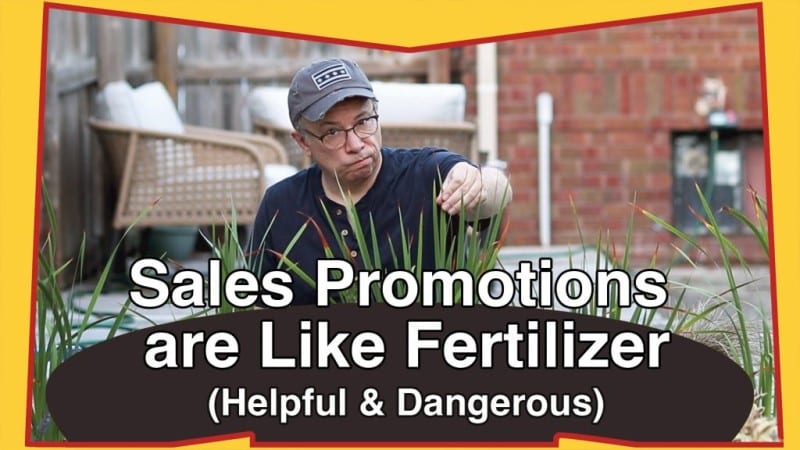
I don’t have much of a backyard to speak of, but I found a patch of dirt and decided to do a little gardening. I went to the local nursery and the lady said to get some fertilizer to help the plants take root and grow faster.
My brain said, “if a little bit of fertilizer is good…a whole bunch of fertilizer must be amazing!!” (Not only is that complete nonsense, but it’s the beginning of about 2 dozen sci-fi movies from the 1950s)
 Think about sales promotions like fertilizer. Occasionally is fine. But use too much, you’ll fry your lawn. The businesses that rely on sales end up being a commodity because when everything else is equal, your price becomes the tie breaker.
Think about sales promotions like fertilizer. Occasionally is fine. But use too much, you’ll fry your lawn. The businesses that rely on sales end up being a commodity because when everything else is equal, your price becomes the tie breaker.
It’s tempting to have a sale, especially when everybody else is. But the cost of having a sale is bigger than sacrificing a little profit.
Eventually the sale is over. But you can’t put the price back to where it was. You need to make up for lost ground and nudge it a bit higher. And if your customers don’t like it, well… you’ll need to add some more fertilizer. Then a little more. And soon, you fry your brand.
Congratulations, you’re a commodity.
With brown leaves.
This doesn’t mean sales promotions are bad. Neither is fertilizer. If you’re trying to grow healthy crops, you’ll need some. But if you use too much fertilizer, your business will smell like manure.
 Behavioral scientist Michelle Klotz cites consumer studies and says “when you use a discount on your product too often, this lower promotional price may become merged into a customer’s reference price. This will lower their willingness to pay for your product when it is no longer discounted, as their idea of how much this product should cost has been altered.”
Behavioral scientist Michelle Klotz cites consumer studies and says “when you use a discount on your product too often, this lower promotional price may become merged into a customer’s reference price. This will lower their willingness to pay for your product when it is no longer discounted, as their idea of how much this product should cost has been altered.”
And it has an impact on the perceived quality of your company: “Consumers are more likely to believe that a brand that promotes more often than others is of poorer quality than others in that industry, while a brand that promotes less often is perceived to be of better quality.”
Les Binet, head of effectiveness at Adam&Eve DDB says “A big chunk of your promoted sales is actually just subsidizing existing sales. You’re giving away discounts to people who would have bought you already.”
“Another chunk of your sales are just time shifted. You’re bringing sales forward. You’re getting extra sales this week at the expense of next week.”
There’s no one-size-fits-all solution to this. Strong brands like Apple, Hermès, and Trader Joe’s are famous for never going on sale. On the other end of the spectrum, JCPenney and Kohl’s will have a sale every week. Someplace between never having a sales promotion and having non-stop sales promotions is likely the sweet spot.
The person handling your digital advertising likely asks you “what’s your promotion this month?” Don’t fall into that trap. Every month, month in and month out, is too much.
How many sales promotions do you do each year?
- Marketing Has a Physics Problem - December 3, 2025
- AI is OK - August 14, 2025
- Emotion in Advertising Equals Dollars in Business - December 3, 2024
